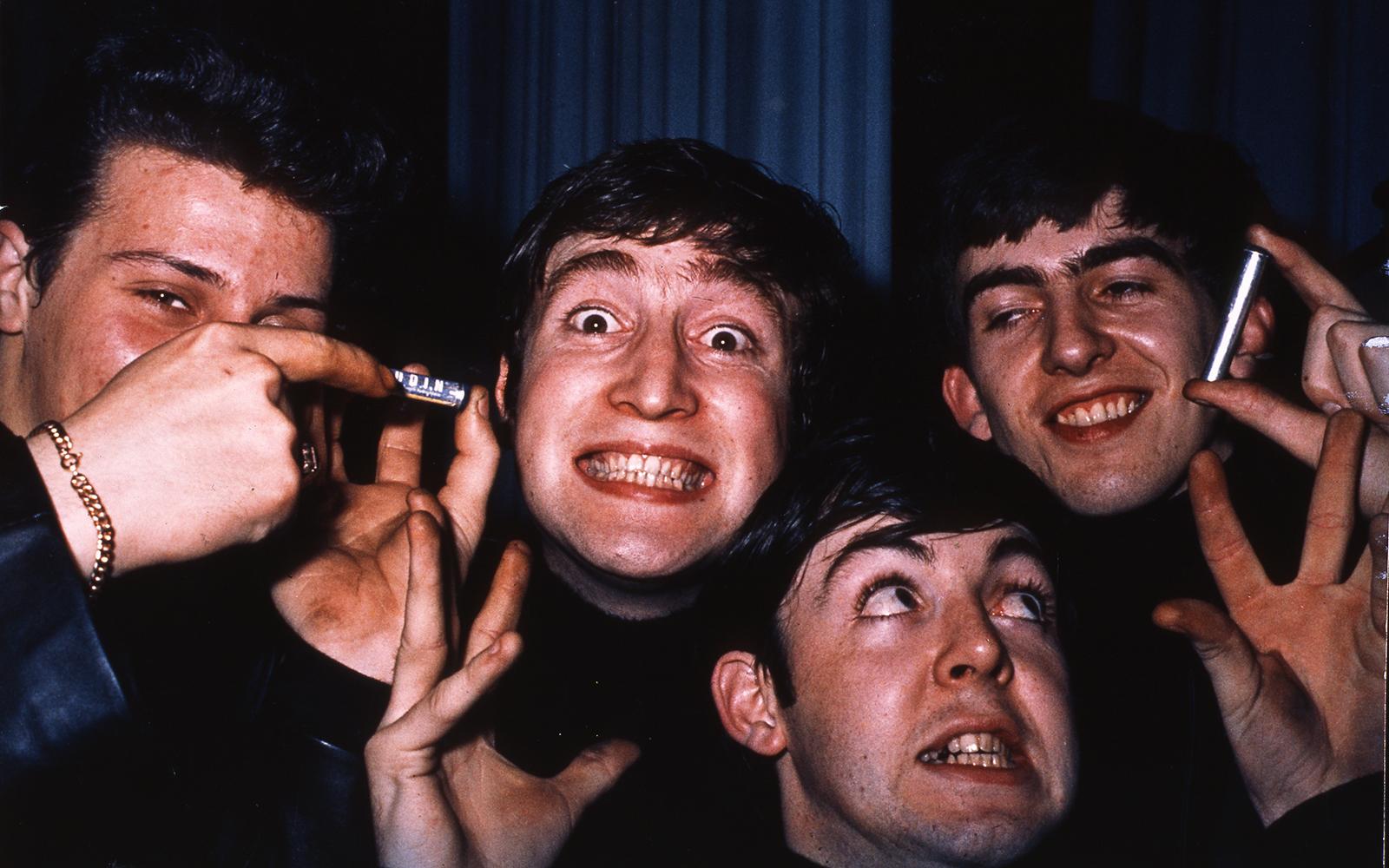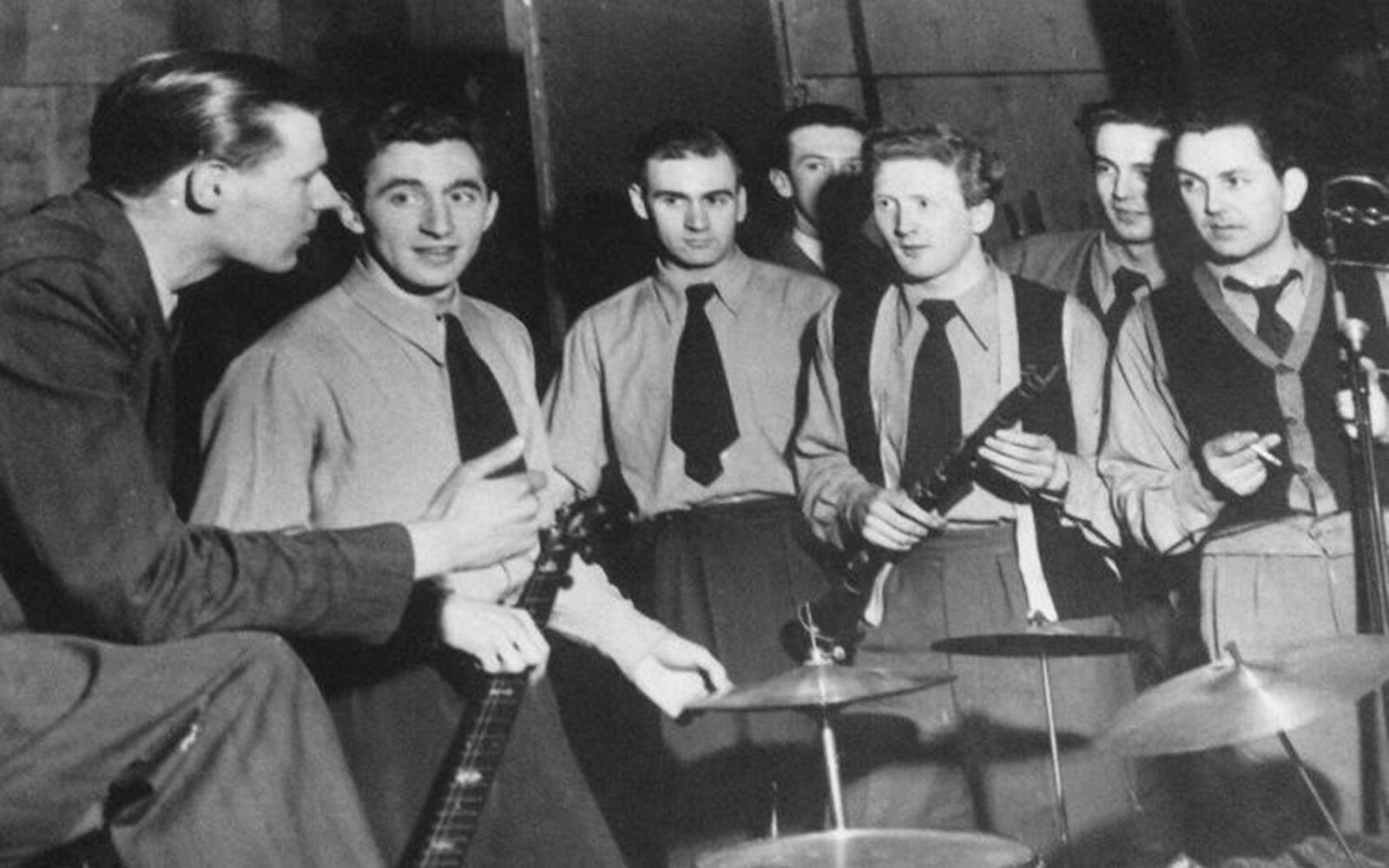|
George Martin took The Beatles - here with with Pete Best-
The Beatles were the warm-up act to my dad's jazz band at the Cavern Carol Birch's trombonist father was a regular at the Liverpool jazz club - then The Beatles changed everything When 16-year-old John Lennon played the Cavern Club with his skiffle band The Quarrymen, a note from the manager was sent up to the stage: "Cut out the bloody rock 'n' roll". The Cavern was a jazz club then, and rock was frowned upon, though skiffle was tolerated. John, ever the rebel, had sneaked in two Elvis songs: Hound Dog and Blue Suede Shoes. Underground, small, and scruffy, the Cavern had opened in Liverpool in 1957, and drawn crowds from the start, in spite of its leaking toilets, tiny stage and the constant smell - of sweat, cheap perfume and rotten fruit from the surrounding warehouses. It was so cramped and hot that condensation dripped from the ceiling and poured down the walls. The acoustics, though, were marvellous. It was soon a fixture on the jazz scene. But, following a change in management and the rise of the "Mersey sound", an uneasy relationship developed between newer bands and the club's regular artists. Sharing bills, they scarcely communicated. Lennon, now with The Beatles, couldn't stand British jazz. It was just a load of self-righteous old buggers hogging the stage and blocking his way. When The Beatles were on, the jazzmen ran to The Grapes across the road. By the start of the 1960s, the Beatles were playing intermission slots for several of these groups, one of which was The Saints Jazz Band from Manchester. My dad, Fred Fydler, was their trombonist.
Northern lights: The Saints Jazz Band, from Manchester The Saints, well known on the thriving northern jazz scene, played the Cavern often. My father lived in two worlds. At home he was just our dad; beyond the front door, he was gigging round England, recording for Parlophone with producer George Martin (later renamed the Fifth Beatle, due to his influence on their early sound), doing radio and occasionally TV. He met Dizzy Gillespie, Coleman Hawkins, Ella Fitzgerald and Count Basie, drank with Jack Teagarden and Earl Hines, and chatted in the artists' bar of the Free Trade Hall with Oscar Peterson. The highlight of his life was playing support for Louis Armstrong's All Stars at Manchester Belle Vue in 1956. After the show, the Saints stayed late, talking, smoking and drinking bourbon with Louis and his musicians. Next morning, at seven, he was up and off to work at Allied Electric in Trafford Park as usual. Most nights he'd come home, have his tea and a nap, get changed and go straight out again. You'd hear a car door slamming in the early hours, an engine throbbing, then the sound of his whistle, soulful and slow and always completely in tune, going down the hall into the back kitchen. Jazz was a constant. He even played his trombone in the bath. On Saturday and Sunday mornings you woke up to the sounds of Sydney Bechet, Bix Beiderbecke, hobo songs, blues, old standards. Then, quite suddenly, it seemed, the old order changed. Hair was the first sign. It triggered something deep in the fathers of England, hard to imagine now. I once had a boyfriend who woke in bed to find his father cutting his hair. Dismayed, my father watched as hair grew and the jazz scene dwindled, in Manchester and everywhere else. He despised and ridiculed any kind of rock and pop. All drivel, he said. Once, when my sister and I, just children then, were watching The Everly Brothers, he walked into the room, switched off the telly and walked out again. It was rubbish, all of it, rubbish, no exceptions. (Funnily enough, long after his death I found an interview with John Mayall, whose Bluesbreakers spawned Peter Green, Eric Clapton and Mick Taylor of The Rolling Stones. Mayall cited The Saints as one of his earliest major influences, so I like to think that, in spite of himself, my dad played his tiny part in the history of rock'n'roll.) They were yobs, he told my sister and me - mouthy and cocky, couldn't play for toffee The Beatles, at the start of their stratospheric rise, released Love Me Do. My sister and I, amazed that be knew them, wanted to hear all. Typical yobs, he told us - greasy hair and leather jackets. Mouthy and cocky. Not a scrap of professionalism, always larking about. Couldn't play for toffee. No talent in them. But when The Saints' Ed Fish had played boogie-woogie on the terrible Cavern piano, he remembered how the four of them, John, Paul, George and Pete (no Ringo yet) had come and stood around and grooved along, clapping their hands. Of all the things The Saints played, this was the only thing the boys really liked. Later, after a few more Beatles bits and a couple of albums, my dad said: "They've not done this by themselves," unable to concede they might have made it on their own talents. "It'll be George Martin." George Martin was writing the songs, he said. My sister pointed out that, if George Martin was so good at knocking up sure-fire hits in an endless row, he'd surely have already done it. "Well, he's behind it," Dad said, as if privy to things we didn't know. But the tide was unstoppable. Long-haired youths discovered the blues and, according to Dad, mangled it. The song The Ballad of Bonnie and Clyde by Georgie Fame was a direct crib from Saint Louis Blues. And it was rubbish, irredeemably all rubbish. But what did we care, my sister and I? I was 12 and she was 15, and we loved boys with long hair, The Stones, The Beatles, Hendrix, Dylan. They all came to our city, Manchester, where we saw The Beatles at the Apollo, The Stones at the Palace. And when Dylan came to the Free Trade Hall I was on the front row overlooking the stage, close enough to see the sweat pouring. It was an infamous concert, bootlegged for posterity and cited in countless articles and biographies. Dylan went electric in the second half, and the purists proved that musical snobbery and conservatism was as alive and well here at the cutting edge of popular music as in my father's mind. Dylan's performance was brilliant. I remember him as a small, frail man in pointed boots, storming on through catcalls, booing and slow hand claps till just before the end when, in a sudden lull in the noise, a lone voice from the audience yelled "Judas!". People can get religious about music. I didn't appreciate till much later how hard it was for my father to see his world replaced, his music - to him the only real music - sidelined by what to him would only ever be "drivel". Did we even notice? Not really. His heart played him up in middle age and he couldn't keep up with the late nights and travelling. In any case, my parents moved down to Stafford where there was no jazz scene to speak of, though my father still played occasionally. Once he took me to a club in Wolverhampton to see one of the big British jazz bands. While he was at the bar the band's trombonist came over, leaned across the table, and said: "Your dad taught me everything I know?' In what I thought of as his old age (he was only 60 when he died) he wore headphones for much of the time. Till the end, he had a head full of jazz. |

